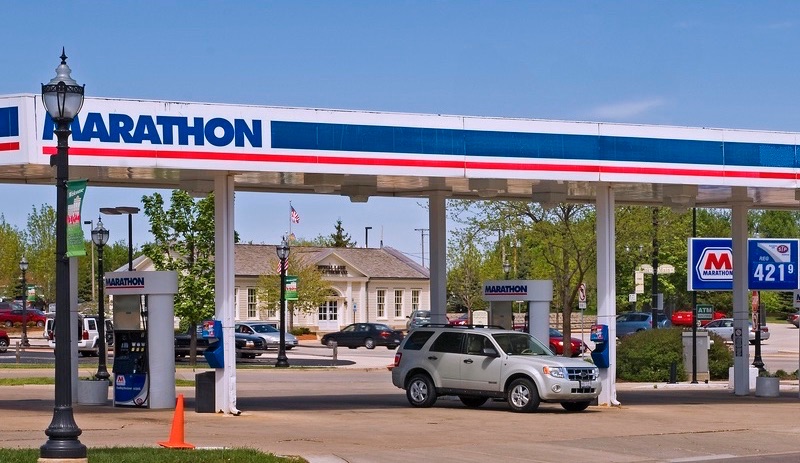Two Senate Democrats this week ordered several Trump administration cabinet members and agency officials to reveal how the oil industry and Koch network have worked behind closed doors to influence the proposed rollback of auto efficiency and emissions standards.
Senator Tom Carper of Delaware and Senate Democratic Leader Charles Schumer sent a letter to the current heads of the Department of Transportation, the Environmental Protection Agency, and others in the administration to demand information about a “covert lobbying campaign with oil industry groups to support Trump Administration efforts to weaken fuel economy standards and increase demand for oil consumption.”
Last week, The New York Times reported on this covert campaign, exposing in particular the efforts of Marathon Petroleum, the largest oil refiner in the country, and groups connected to Koch Industries and the refinery magnates Charles and David Koch.
From the Senators’ letter:
“As reported by the Times, the campaign included contacts with federal agencies, including meetings between former Environmental Protection Agency (EPA) Administrator Scott Pruitt and Marathon Petroleum CEO Gary Heminger. The campaign also reportedly used a front group, Energy4US, to mask its ties to the oil industry and advertise on social media urging consumers to comment on and support the Department of Transportation and EPA rulemakings that would weaken fuel economy standards.
It is no surprise that weakened fuel economy standards would increase greenhouse gas emissions and the amount of gasoline consumers would have to buy which would, in turn, increase oil industry profits. As Marathon’s CEO recently told its investors, a rollback of fuel economy standards would amount to Americans consuming an additional 350,000 to 400,000 barrels of gasoline per day.”
The front group mentioned, Energy4US, was first identified by DeSmog’s KochVsClean as a project of American Fuel and Petrochemical Manufacturers (AFPM) and the Consumer Energy Alliance (CEA).
Specifically, Senators Carper and Schumer requested the following:
- “Please provide a list of all meetings (including in-person meetings, telephonic and video conferences) that have occurred since January 20, 2017 between any political appointee at the covered agency, and any representative of Marathon Petroleum, AFPM (or any of its member companies), Koch Industries, ALEC (or any of its members) or Americans for Prosperity, at which fuel economy or greenhouse gas tailpipe standards was discussed, including the date of the meeting and a list of all meeting attendees and their affiliation(s).
- For each such meeting, please provide copies of all emails, meeting notes and summaries, memos, or other written materials, provided in advance of, at, or following the meeting, to any political appointee at the covered agency.
- Please provide copies of all correspondence (including letters, memos, emails, powerpoint presentations or other materials) received (or sent by) any political appointee at the covered agency from (to) any representative of Marathon Petroleum, AFPM (or any of its member companies), Koch Industries, ALEC (or any of its members) or Americans for Prosperity related to fuel economy or greenhouse gas tailpipe standards.”
The senators have requested that the agencies to provide these records by the end of January 2019.
The few public records that have already emerged have revealed many touchpoints between the Marathon and Koch network officials and the administration. According to documents obtained by the Sierra Club, former EPA Administrator Scott Pruitt had two meetings scheduled with Marathon executives. A copy of top EPA air regulator Bill Wehrum’s private calendar lists another meeting with Marathon.
Meanwhile, records provided to The New York Times by the watchdog group Documented revealed Marathon’s efforts to gain support from Republican state leaders for the proposed standards rollbacks.
“This process to reconsider the existing CAFE [corporate average fuel economy] standards is important, as there are significant concerns about the existing standards potential negative impacts on vehicle safety, cost, and consumer choice,” wrote Steven Higley, manager of federal government affairs for Marathon Petroleum, in an email to Wisconsin Rep. Kuglitsch, who is a member of the American Legislative Exchange Council’s (ALEC) Energy, Environment, and Agriculture (EEA) task force. “Therefore MPC is strongly supportive of the model resolution on CAFE standards that will be considered at the Aug. 9 EEA task force meeting.”
Senators Carper and Schumer aren’t the only ones looking for these records. Earlier this week, the Environmental Defense Fund (EDF) sued the Department of Transportation over the agency’s failure to release public records that EDF requested about meetings and correspondences between the oil industry and the agency on the subject of the Safer Affordable Fuel Efficient (SAFE) Vehicles Proposed Rule, which is how the proposed clean car standards rollback is officially known.
“EDF is going to court to enforce the American people’s right to know what’s driving the Trump administration’s attacks on our nation’s clean car and freight truck standards,” EDF attorney Ben Levitan said on Wednesday.
Now facing a lawsuit and demands from sitting senators, perhaps the agency will finally release the public records that will reveal who was working to rollback clean car standards, and just how much influence the oil industry had in shaping the proposed rules.
Main image: Marathon gas station. Credit: Ron Cogswell, CC BY 2.0Subscribe to our newsletter
Stay up to date with DeSmog news and alerts







